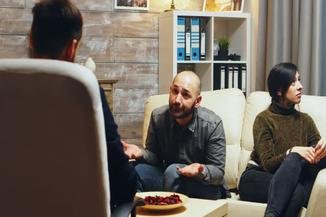Book Appointment Now
Why Did I Do That?

The Clash Between Emotion and Logic in a World of Abundance
The simple answer is we make decisions based on emotion and then use logic to justify them.
We’ve all been caught shaking our heads, asking ourselves, “What was I thinking?” Most often, the best or only explanation is, “It was a good idea at the time.” Or, as Flip Wilson would say on his variety show, which aired on NBC in the early seventies, “The devil made me do it.” The truth is, it’s a little of both.
Why the emphasis on emotion? Forget the complexities of triggering the hormonal system or the deep dive into Behavioral Psychology; that’s a topic for another time. We resort to emotion to overcome the negative, which is the inconvenient half of any logical thought. Much like someone who thinks raising their voice will win the argument.

Consider this: 97% — 98% of what we do is on a subconscious level; it drives us. 90% of our thoughts when making decisions are negative — this is tough to overcome. It explains why it’s so easy to go from positive to negative and so difficult to transition from negative to positive.
Let’s pull back the curtain for a moment. We often live our lives in the negative, the world of “No,” which is alive and well in the subconscious. How did this come about? It’s primal.
For tens of thousands of years, man’s sole purpose was to survive and procreate, believing in strength in numbers. To survive, he had to know the dangers: don’t eat those mushrooms; that cave could be a bear den; everything had a warning sign.

The birth of a new tribe member was a joyous occasion, but what kept him alive was knowing about the dangers like a saber-toothed tiger in the area or a rumored raid by a competing tribe. The good news was appreciated, but knowing the bad news was crucial for survival. That same DNA, imprinted over thousands of years, is present in all of us today.
Why do we read newspapers, watch the news, or gather around during a disaster? It’s because we need to know the bad news. Survival, the strongest of the eight primal needs, still controls our daily lives. Logic keeps you alive; emotions can lead to danger.
it’s estimated that by the age of two, we’ve heard the word “NO” two thousand times. That’s a significant foundation of negativity, but it’s necessary for protection and safety.

You can see examples everywhere. When asking for directions, you might be told, “Go down to the red light and turn right.”
Rarely is it mentioned as the green light — it’s for safety.
How often have you said, “I have a great idea,” only to be told it won’t work before you finish your sentence? Our inclination towards negativity is continually reinforced. Our primary defense against this is emotion, and therein lies the problem.

Then there’s the supermarket. Perhaps it’s the greatest laboratory to study human behavior. On the logical side, some contemplate every purchase based on freshness, ingredients, nutritional value, cost, and long-term health benefits. On the emotional side, you might find carts filled with processed packaged food and sugary drinks. This difference epitomizes the clash between emotion and logic.

The fulfillment of needs has driven ninety percent of our evolution. For millennia, man relied on logic to meet these needs, viewing his environment through a lens of caution. Most things were considered threats until proven otherwise. But from being constantly on guard against potential dangers, our primal needs, coded in our DNA, are suddenly confronted by the “modern civilization” — a world abundant with desires.
So, what’s the implication? When man was driven by needs, there was no room for wants. In that era, he either created what he needed or it didn’t exist. I doubt that while expanding his territories, he fantasized about riding a mammoth to expedite the journey. Today, in the “Modern World,” needs are almost taken for granted. With the convenience of technology like iPhones, we often let emotion guide us, sidelining logic.
So… Why Did I Do That?
It’s simple: because you could. But deep down, you knew better, or you wouldn’t have relied on the emotion of false promise to overshadow logic. You sought the rush, the thrill. And when you finally use logic to justify your action, it doesn’t align.
That’s when the question, “Why Did I Do That?” arises. Sometimes, the anticipation of acquiring something is more exhilarating than the actual possession.
It’s a battle of:
- Needs vs. Wants
- Logic vs. Emotion
- Primal vs. Modern Man.
Remember, you might think you’ve outgrown your primal needs, but they haven’t outgrown you.
Next time you’re swayed by emotion for something you desire, perhaps consider the Return Policy first!



